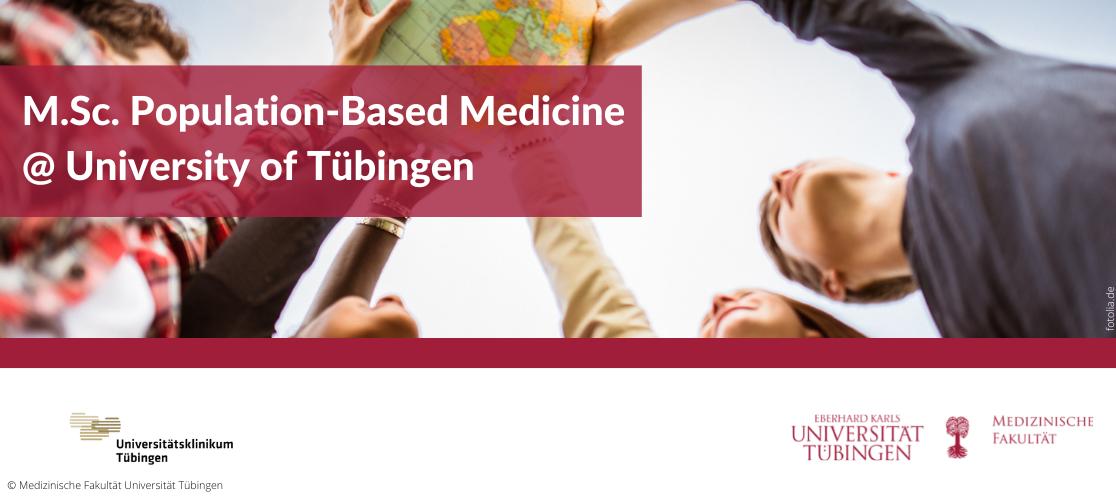The Master’s Program Population Based Medicine offers a challenging program at a competitive international level for which high individual effort and performance are required We strive to prepare students to respond to both challenges and opportunities to improve health within and across populations. Our goal is to train future population health experts with outstanding methodological knowledge and interdisciplinary expertise to address the full range of factors influencing health and disease. Population-Based Medicine works with big datasets and epidemiological and statistical methods to identify patterns in the diseases and health of large populations.
The Master's Program Population-Based Medicine

Population-Based Medicine includes the designing, implementation and evaluation of intervention programs for health problems (e.g., lifestyle modification strategies and stress management), the development of prevention strategies at the population level (e.g., for diabetes, cardiovascular conditions, and cancer), as well as the development of policy recommendations, health education and outreach at community and population level (e.g., digital health technologies).
The Population-Based Medicine program in Tübingen is a 4-semester full-time program completely offered in English. One of the most important features of the program is a mandatory practicum in the third semester which can be completed in Germany or abroad. The master program is accredited and applies the European Credit Transfer and Accumulation System (ECTS).
Current information
Online information event 2026
On 21st January 2026, 5.00 pm (CET) we will be hosting an online information event. Please send an email to pbm.studium@med.uni-tuebingen to register for this event.
For international students
from visa countries
If you are an international student from a visa country, consider booking yourself a visa appointment early, since in some countries it takes exceptionally long to even get an appointment. We therefore recommend you to book a visa appointment (and also acquire a certificate from the Academic Evaluation Center if applicable) early on. In case of a successful application for the PBM program the decision regarding admission is expected to be made around mid-to end-May.
key figures




Insights into the program


News
Contact
Program Director

Prof. Dr. Norbert Schmitz
Head of Department Population-Based Medicine
E-mail address: norbert.schmitz@med.uni-tuebingen.de
Contact person

Dr. Tanja Seifried-Dübon
Program Coordinator
E-mail address: pbm.studium@med.uni-tuebingen.de
Phone number: +49 7071 29-87111
Study PBM @Tübingen!

M.Sc. PBM Booklet
Check out our Booklet!Further information
How to apply and further information
Frequently Asked Questions
What is the difference between the PBM program and a Public Health program?
A simple approach to bridging population-based medicine and public health: population-based medicine is the basic science of public health, much as biomedical research is the basic science of clinical medicine. Population-based medicine provides the basic understanding of how health is produced, while public health aims to apply that understanding toward building and promoting health in populations. https://pubmed.ncbi.nlm.nih.gov/30207758/
What is the difference between the PBM program and an Epidemiology program?
Epidemiology provides essential knowledge to design, implement, and assess approaches to effectively prevent disease and improve health in populations. Epidemiological methods are the cornerstones of population health and population-based medicine, which consider the broader picture by integrating concepts, methods and evidence from behavioral, environmental, biological, social, economic, cultural, and psychological science.
Which first degree is required for the M.Sc. Population-Based Medicine program?
You need a Bachelor’s Degree (or an equivalent degree of at least 6 semesters) in Health Sciences or a comparable subject. Examples for potentially comparable subjects are:
- Public Health
- Epidemiology
- Medicine
- Dentistry
- Nursing
- Midwifery
- Nutrition
- Pharmacy
- Health Economics
- Health Policy
- Biostatistics
- Psychology
- Sports
- Sociology
- Cognitive Sciences
- ...
Make sure to include a Transcript of Records or similar documents which describe the contents of your Bachelor’s Degree in order to allow for assessment of the comparability of the field. A final decision can only be made based on your complete application.
Do I need any specific skills in statistics and methods?
Yes, good knowledge in statistics and research methods is expected and these topics will be discussed during the selection interview.
How many students will be admitted?
There are 20 study places in Population-Based Medicine per year.
When does the program start?
The program starts in the winter semester (courses start mid-October).
What is the deadline for applications?
The deadline for your application is 15th April. Applications received after this date cannot be considered in the selection process.
What is the language of instruction?
All courses and examinations will be held in English. You need English skills at the B2 level (CEFR). A corresponding certificate must be submitted with the application.
Do I also need German language skills?
Although you won’t need German in your courses, German skills are useful for managing your everyday life in Tübingen or in case you would like to complete your practicum in a German organization. Consider taking German lessons at the Centre for German as a foreign language.
What is the schedule of the program?
In the first two semesters, courses will be held according to a fixed schedule. In the third semester you will complete your mandatory practicum and attend an online practicum seminar. In the fourth semester you will attend a Master’s colloquium and write your thesis. The detailed schedule can be found in the module handbook which is available here.
Is there an opportunity to study abroad during the program?
A good opportunity to spend time abroad during your master studies is the practicum/internship in the third semester. Start looking for potential practicum organizations early and use a practicum/internship abroad for getting to know yet another health system.
What are my career prospects with a degreein Population Based Medicine?
With a degree in Population-Based Medicine you can work in a variety of public and private organizations in the health sector (e.g., hospitals, consulting agencies), as well as NGOs. You will also be ready for pursuing PhD studies.

